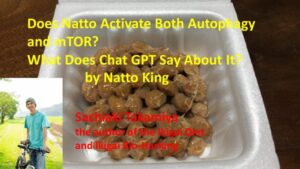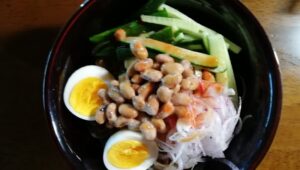Biohacking in the Age of AI
Get the Japanese Superfood List
This is the continuation of the two previous posts, leading to EI, which isn’t anything to do with Emotional Intelligence.
AI isn’t Scary, People’s Stupidity is, from Ikigai’s Point of View
The hype of AI development continues to dominate the headlines. It seems that we will all be using some form of AI system, whether it is ChatGPT or Bard, just like we began using a smartphone a decade ago.
How will this change our lives?
Many people are making different predictions, both positive and negative. But what can I foresee for the future of our health?
One direction we are heading is a highly technological healthcare system. We will be using AI to diagnose our conditions and apply optimal measures in our diet, fasting, exercises, and even mental work. If we ask AI to custom design our lifestyle, it will do it, and all we need to do is follow the protocol.
On the other hand, there will be a great number of the population who lead an even more sedentary lifestyle. They will sit in front of the computer all day, asking every single question to their AI language model, and spending the majority of their time in Web 3 or Metaverse.
Even though they have their custom-designed health protocol written down in front of them, they are too lazy to lift their butt. There will be businesses catering to those crowds providing easier solutions such as supplements.
So, the future of AI and health will be polarized.
Among the health-conscious, there will also be polarization. Some people will embrace transhumanism, while others will choose Ikigai Bio-Hacking or Shizenha Bio-Hacking.
Even more than ever, it will be critical to keep the connection to the natural world and the analog world.
This doesn’t necessarily mean turning our back on the digital world. We can still reap the rewards of technological development. But we need to stay tuned into the natural world in order to make better use of technology.
By working in the garden, going for walks under the morning sun, making and eating fermented food to stay connected to the world of microbiome, and doing qi-gong in the forest to receive plenty of ki energy, we will be balanced and have a stable mindset to use AI for the best interest of humanity.
Today, I only use a PC, not a smartphone, and I check my mail and messages twice a day. I find this lifestyle very convenient. I can use the tools available without distracting my rhythm.
However, many people out there are constantly wired and checking their messages every single minute, even before going to bed and after getting up. This has a detrimental effect on your sleep. I don’t think they lead a convenient lifestyle at all. They are slaves of technology.
The same thing will happen with a much more escalated scale in the future. There will be people who continue to be wise and people who destroy themselves.
Wise people know this. You don’t want to be too convenient. You need to have a good balance of the sympathetic nervous system and parasympathetic nervous system. If you have too much stress, your sympathetic nervous system is constantly active, and you will lose balance. If you are too comfortable and relaxed, your parasympathetic nervous system is active all the time, and you will lose balance, too. Being too convenient means, you will be too comfortable. You do need a certain amount of stress in your life to keep the balance.
To balance yourself, please read Chapter 7, Digital Fasting in Ikigai Bio-Hacking: Bio-Hacking Based on Japanese Natural Health.

